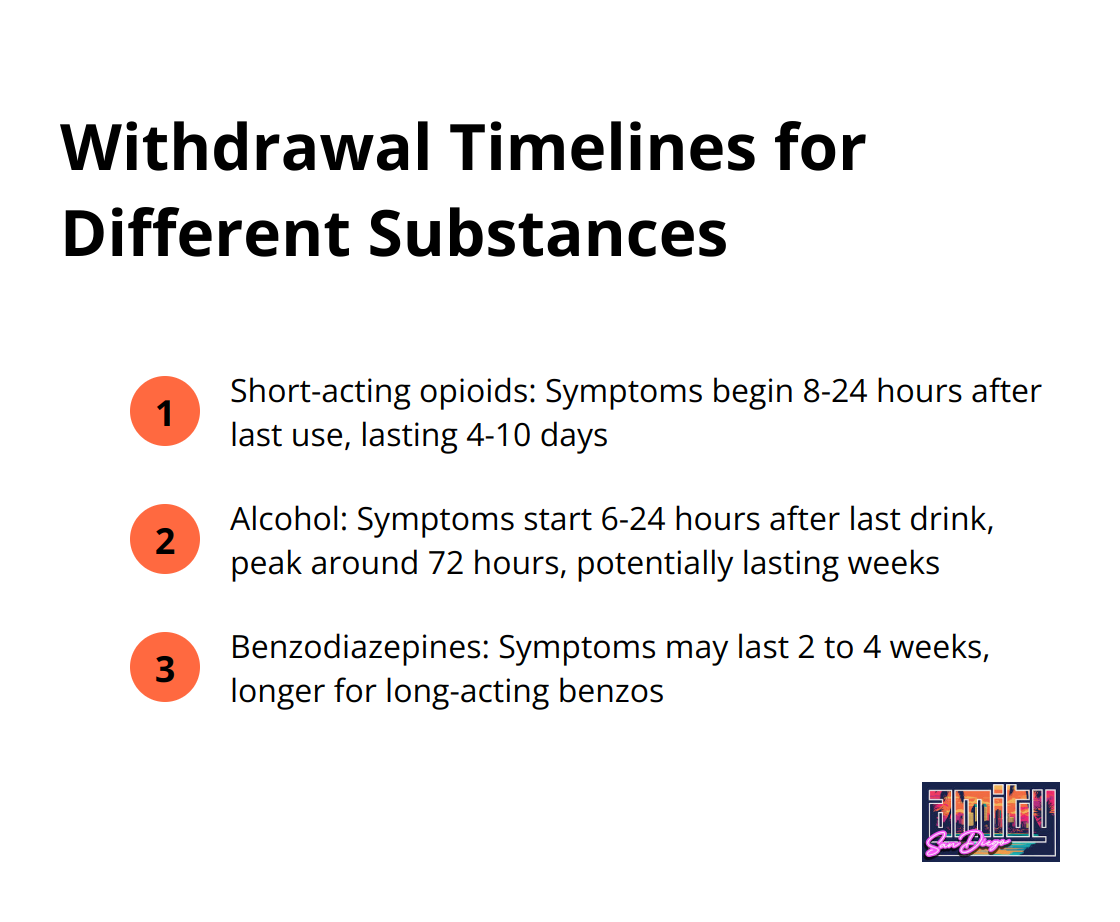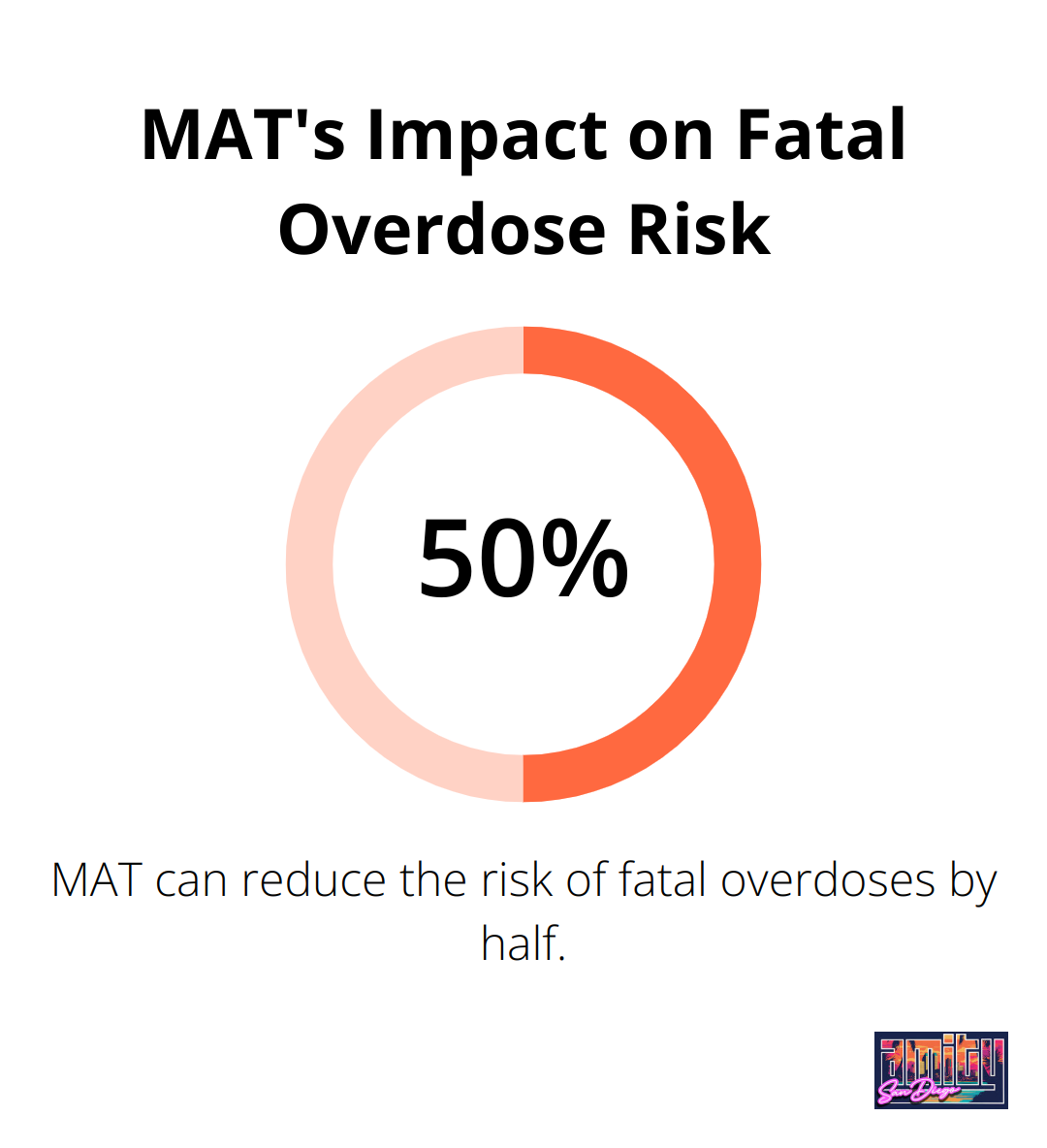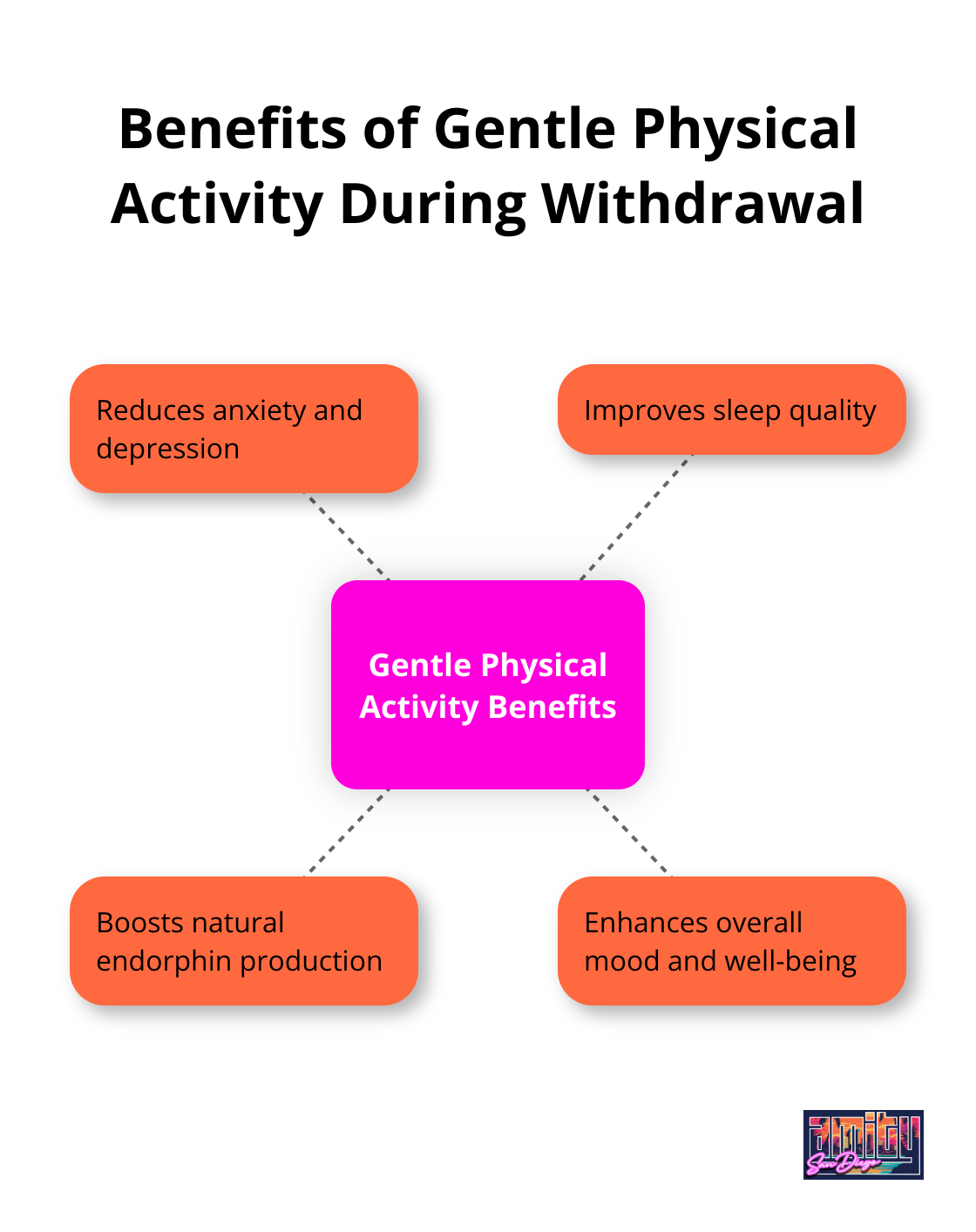Withdrawal symptoms can be a challenging hurdle on the path to recovery. At Amity San Diego, we understand the complexities of this process and its impact on individuals seeking to overcome addiction.
Our team of experts has compiled a comprehensive guide to help you navigate this crucial phase with confidence and comfort. In this post, we’ll explore effective strategies and holistic approaches to manage withdrawal symptoms and support your journey towards lasting recovery.
What Happens During Withdrawal?
Physical Symptoms of Withdrawal
The body’s reaction to substance cessation can be intense. Physical symptoms of withdrawal may include intense cravings and feeling physically ill. For alcohol withdrawal, symptoms can escalate to potentially dangerous levels, including seizures in severe cases. Opioid withdrawal often mimics severe flu symptoms, with chills, body aches, and gastrointestinal distress.
Psychological Impact of Withdrawal
The mental and emotional aspects of withdrawal can be equally challenging. Anxiety, irritability, and mood swings are common across various substance withdrawals. Depression is a significant concern, particularly with stimulant withdrawal. Some individuals may experience intense cravings, making it essential to have coping strategies in place.
Timeline and Duration
The withdrawal timeline varies depending on the substance and individual factors. For short-acting opioids, symptoms typically begin 8-24 hours after the last use and can last 4-10 days. Alcohol withdrawal often starts within 6-24 hours after the last drink, with symptoms peaking around 72 hours and potentially lasting for weeks.
Benzodiazepine withdrawal symptoms may last 2 to 4 weeks, but can be longer for longer-acting benzos. This extended timeline emphasizes the importance of long-term support and carefully managed tapering under medical supervision.

Individualized Approach to Withdrawal
Each person’s withdrawal experience is unique. Factors such as the type of substance used, duration of use, overall health, and genetic predisposition all play a role in how withdrawal manifests. A personalized approach to withdrawal management (tailored to each individual’s specific needs) can significantly improve comfort and safety during this challenging phase.
The Role of Professional Support
Professional support during withdrawal can make a substantial difference in the recovery process. Medical professionals can provide medications to alleviate symptoms, monitor vital signs, and address any complications that may arise. Additionally, mental health support during this time can help individuals cope with the psychological aspects of withdrawal and prepare for the next steps in their recovery journey.
As we move forward, we’ll explore effective strategies for managing withdrawal symptoms, including medical detox options and medication-assisted treatment. These approaches can significantly enhance comfort and safety during the withdrawal process.
Effective Withdrawal Management Strategies
At Amity San Diego, we have developed a comprehensive approach to manage withdrawal symptoms. Our strategies maximize comfort and safety during this critical phase of recovery.
Medical Detox: The Foundation of Safe Withdrawal
Medical detox often serves as the first step in addiction treatment. It involves 24/7 medical supervision to manage withdrawal symptoms and prevent complications. Medical detox can significantly reduce the risk of relapse and life-threatening complications during withdrawal.
While our San Diego location doesn’t offer on-site detox, we collaborate with trusted partners to ensure our clients receive top-notch care during this phase. Our team assesses each individual’s needs and coordinates seamless transitions to appropriate detox facilities when necessary.
Medication-Assisted Treatment: A Breakthrough in Withdrawal Management
Medication-Assisted Treatment (MAT) has transformed withdrawal management. The FDA has approved several medications that alleviate withdrawal symptoms and reduce cravings. For opioid withdrawal, medications like buprenorphine and methadone have shown remarkable efficacy. MAT can cut the risk of fatal overdoses by half.

We integrate MAT into our treatment plans when appropriate. Our medical team evaluates each client to determine if MAT could benefit their recovery journey. We use every evidence-based tool available to support our clients through withdrawal and beyond.
The Importance of Professional Supervision
Professional supervision is essential during withdrawal. The risks associated with unsupervised withdrawal can be severe, especially for alcohol and benzodiazepines. Alcohol withdrawal can lead to severe complications, particularly in patients with alcohol use disorders (AUDs) who are referred to neurological departments for various conditions.
Our team includes board-certified physicians, licensed therapists, and experienced nurses who provide round-the-clock care. We monitor vital signs, adjust medications as needed, and offer immediate intervention if complications arise. This level of professional oversight not only enhances safety but also provides peace of mind for our clients and their families.
Personalized Withdrawal Management Plans
Every individual experiences withdrawal differently. Factors such as the type of substance used, duration of use, and overall health influence the withdrawal process. We create personalized withdrawal management plans that address each client’s unique needs and challenges.
These plans may include a combination of medical interventions, psychological support, and holistic therapies (e.g., nutrition counseling, mindfulness practices). By tailoring our approach, we can address the physical, emotional, and psychological aspects of withdrawal more effectively.
As we move forward, we’ll explore holistic approaches that complement these medical strategies, providing a well-rounded approach to easing withdrawal symptoms and supporting long-term recovery.
How Holistic Approaches Ease Withdrawal
Nourishing Your Body for Recovery
Proper nutrition and hydration play a vital role in easing withdrawal symptoms and supporting the body’s healing process. During withdrawal, many individuals experience gastrointestinal distress, which can lead to dehydration and electrolyte imbalances. We recommend:
- Drinking at least 8-10 glasses of water daily
- Consuming electrolyte-rich beverages like coconut water or sports drinks
- Eating small, frequent meals to prevent nausea
- Focusing on nutrient-dense foods like lean proteins, fruits, and vegetables
A study published in the Journal of Clinical Medicine found that nutrition-related education and patient counseling beyond early detoxification stages could positively influence recovery outcomes. Nutritionists develop personalized meal plans that support each client’s unique needs during this critical time.
The Power of Movement in Recovery
While intense exercise isn’t recommended during acute withdrawal, gentle physical activity can have significant benefits. Low-impact exercises like walking, stretching, or yoga can:
- Reduce anxiety and depression
- Improve sleep quality
- Boost natural endorphin production
- Enhance overall mood and well-being

A study examined the feasibility of aerobic exercise as an adjunct to substance abuse treatment among drug dependent patients. Tailored physical activities (appropriate for each client’s current health status and withdrawal stage) are incorporated into treatment plans.
Mindfulness and Relaxation Techniques
Stress and anxiety are common during withdrawal, making relaxation techniques invaluable tools for managing symptoms. Mindfulness practices, such as meditation and deep breathing exercises, can:
- Reduce cravings
- Improve emotional regulation
- Enhance overall stress management
A systematic review and meta-analysis examined mindfulness treatment for substance misuse. Daily guided meditation sessions and practical mindfulness techniques are offered to clients.
The Healing Power of Community
Support groups and therapy play a key role in the holistic approach to withdrawal management. Connecting with others who understand your experiences provides emotional support, reduces feelings of isolation, and offers practical coping strategies.
A long-term study published in the Journal of Studies on Alcohol and Drugs found that individuals who participated in support groups were twice as likely to maintain sobriety compared to those who didn’t. Both peer support groups and individual therapy sessions create a comprehensive support network for clients.
Final Thoughts
Managing withdrawal symptoms requires personalized care and a comprehensive approach. At Amity San Diego, we combine medical expertise, holistic therapies, and ongoing support to provide effective withdrawal management. Our tailored strategies address each individual’s unique needs, ensuring the most comfortable experience possible during this challenging phase.
Recovery extends beyond the initial withdrawal period and demands a commitment to ongoing care and lifestyle changes. We emphasize the importance of aftercare planning, which may include continued therapy and support group participation. These strategies help maintain progress and provide tools for navigating life’s challenges without substance use.
Professional help can make a significant difference when facing withdrawal symptoms. Amity San Diego offers evidence-based treatment programs that address both addiction and co-occurring mental health conditions. Our team of experienced professionals will guide you through every stage of the process, from initial assessment to long-term recovery planning.

